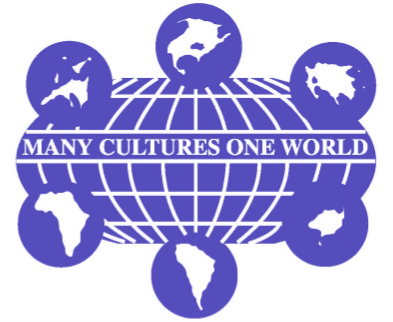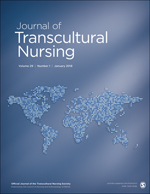 Guidelines for Implementing Culturally Competent Nursing by Douglas, M.K., Rosenkoetter, M., Pacquiao, D.F., Callister, L.C., Hattar-Pollara, M., Lauderdale, J, Milstead, J., Nardi, D., Purnell, L. Link to article: http://tcn.sagepub.com/content/current
Guidelines for Implementing Culturally Competent Nursing by Douglas, M.K., Rosenkoetter, M., Pacquiao, D.F., Callister, L.C., Hattar-Pollara, M., Lauderdale, J, Milstead, J., Nardi, D., Purnell, L. Link to article: http://tcn.sagepub.com/content/current
 Core Curriculum for Transcultural Nursing and Health Care: The ISBN for the Core Curriculum for Transcultural Nursing and Health Care is: 1-4129-9249-4 or Contact SAGE Publications to order your copy at 800‐818‐SAGE (7243), or email: journals@sagepub.com Individual Chapters Login to the Journal of Transcultural Nursing hosted on SAGE Journals Online to purchase those chapters that are most relevant to your practice: http://journals.sagepub.com/home/tcna
Core Curriculum for Transcultural Nursing and Health Care: The ISBN for the Core Curriculum for Transcultural Nursing and Health Care is: 1-4129-9249-4 or Contact SAGE Publications to order your copy at 800‐818‐SAGE (7243), or email: journals@sagepub.com Individual Chapters Login to the Journal of Transcultural Nursing hosted on SAGE Journals Online to purchase those chapters that are most relevant to your practice: http://journals.sagepub.com/home/tcna
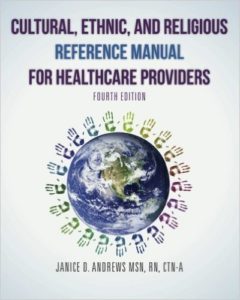 Cultural, Ethnic, and Religious Reference Manual for Healthcare Providers 4th Edition by Janice D. Andrews MSN RN CTN-A (Author): Ms. Andrews’ long career as a nurse in clinical settings, makes her intimately aware of the patient diversity in the face of frenzied schedules and little to no previous formal education of providers related to diversity and transcultural nursing is reflected in her approach to developing the contents of this book. While reminding the reader of each individual’s uniqueness, the Manual maintains the highly successful and sought after conciseness of previous editions while building upon the most recently available healthcare-related data, statistics, and transcultural research: http://www.amazon.com/Cultural-Religious-Reference-Healthcare-Providers/dp/1481197584
Cultural, Ethnic, and Religious Reference Manual for Healthcare Providers 4th Edition by Janice D. Andrews MSN RN CTN-A (Author): Ms. Andrews’ long career as a nurse in clinical settings, makes her intimately aware of the patient diversity in the face of frenzied schedules and little to no previous formal education of providers related to diversity and transcultural nursing is reflected in her approach to developing the contents of this book. While reminding the reader of each individual’s uniqueness, the Manual maintains the highly successful and sought after conciseness of previous editions while building upon the most recently available healthcare-related data, statistics, and transcultural research: http://www.amazon.com/Cultural-Religious-Reference-Healthcare-Providers/dp/1481197584
 Transcultural Concepts in Nursing Care, Seventh Edition: Margaret M. Andrews, Joyceen S. Boyle (2016). Philadelphia: Wolters Kluwer. To read the first chapter for free, clink on http://thepoint.lww.com/book/show/597900# Transcultural Concepts in Nursing Care helps nurses and nursing students transform their thinking so they acquire the necessary knowledge and skills to provide culturally congruent and competent care for individuals, families, groups, and communities of diverse backgrounds. Transcultural Concepts in Nursing Care takes a life span approach to describe cultural variations in lifestyle, habits, beliefs, and life process; and in doing so, provides a framework that will improve health and nursing care delivered to people from different national origins, races, ethnicities, religions, genders, ages, abilities/disabilities, sexual orientations, and sizes, including those from traditionally underrepresented, disenfranchised, and marginalized populations. Rather than stereotyping the beliefs and practices of people from specific cultures, the authors provide nurses with the tools they need to effectively perform cultural assessments and incorporate their findings into plans, interventions, and evaluations. New in this edition is the Andrews/Boyle Transcultural Interprofessional Practice (TIP) Model that illuminates the necessity for increased collaboration, communication, and team work for the delivery of culturally competent nursing and health care.
Transcultural Concepts in Nursing Care, Seventh Edition: Margaret M. Andrews, Joyceen S. Boyle (2016). Philadelphia: Wolters Kluwer. To read the first chapter for free, clink on http://thepoint.lww.com/book/show/597900# Transcultural Concepts in Nursing Care helps nurses and nursing students transform their thinking so they acquire the necessary knowledge and skills to provide culturally congruent and competent care for individuals, families, groups, and communities of diverse backgrounds. Transcultural Concepts in Nursing Care takes a life span approach to describe cultural variations in lifestyle, habits, beliefs, and life process; and in doing so, provides a framework that will improve health and nursing care delivered to people from different national origins, races, ethnicities, religions, genders, ages, abilities/disabilities, sexual orientations, and sizes, including those from traditionally underrepresented, disenfranchised, and marginalized populations. Rather than stereotyping the beliefs and practices of people from specific cultures, the authors provide nurses with the tools they need to effectively perform cultural assessments and incorporate their findings into plans, interventions, and evaluations. New in this edition is the Andrews/Boyle Transcultural Interprofessional Practice (TIP) Model that illuminates the necessity for increased collaboration, communication, and team work for the delivery of culturally competent nursing and health care.
 The Process of Competemility in the Delivery of Healthcare Services: Unremitting Encounters. Campinha-Bacote, J (2020). http://transculturalcare.net/books-2/. A medley of definitions and conceptualizations has created intense discussion around the construct of cultural competence, questioning its true ability to address cross-cultural problems in healthcare delivery. One ongoing debate centers around the relationship between cultural competence and cultural humility. These discussions have led for calls to either replace cultural competence with the concept of cultural humility, view cultural competence and cultural humility as being in apposition (i.e., side-by-side), rather than in opposition of each, or to simply redefine cultural competence. The Process of Cultural Competemility in the Delivery of Healthcare Services model proposes that cultural humility and cultural competence enter into a synergetic relationship, resulting in a combined effect that is greater than the sum of their separate effects. This synergistic relationship is embodied in the term, “cultural competemility.” The origin of cultural competemility is the deliberate blending of the terms cultural competence (compete) and cultural humility (mility) to create the coined term cultural competemility. In this book, readers will take a personal journey towards cultural competence in healthcare delivery. This journey includes examining the practice model, The Process of Cultural Competemility in the Delivery of Healthcare Services.
The Process of Competemility in the Delivery of Healthcare Services: Unremitting Encounters. Campinha-Bacote, J (2020). http://transculturalcare.net/books-2/. A medley of definitions and conceptualizations has created intense discussion around the construct of cultural competence, questioning its true ability to address cross-cultural problems in healthcare delivery. One ongoing debate centers around the relationship between cultural competence and cultural humility. These discussions have led for calls to either replace cultural competence with the concept of cultural humility, view cultural competence and cultural humility as being in apposition (i.e., side-by-side), rather than in opposition of each, or to simply redefine cultural competence. The Process of Cultural Competemility in the Delivery of Healthcare Services model proposes that cultural humility and cultural competence enter into a synergetic relationship, resulting in a combined effect that is greater than the sum of their separate effects. This synergistic relationship is embodied in the term, “cultural competemility.” The origin of cultural competemility is the deliberate blending of the terms cultural competence (compete) and cultural humility (mility) to create the coined term cultural competemility. In this book, readers will take a personal journey towards cultural competence in healthcare delivery. This journey includes examining the practice model, The Process of Cultural Competemility in the Delivery of Healthcare Services.
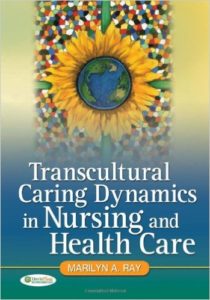 Ray, M. (2015). Transcultural Caring Dynamics in Nursing and Health Care, 2nd edition . Philadelphia: F. A. Davis Company. Download Flyer Here
Ray, M. (2015). Transcultural Caring Dynamics in Nursing and Health Care, 2nd edition . Philadelphia: F. A. Davis Company. Download Flyer Here
 Eighth edition of Cultural Diversity in Health and Illness, Rachel E. Spector. The text continues to promote an awareness of the dimensions and complexities involved in caring for people from diverse cultural backgrounds and examines the differences in the HEALTH - the balance of the person, both within one’s being, physical, mental, and spiritual—and in the outside world—natural, communal, and metaphysical - beliefs and practices existing within North America. Features include – a student resource page that is an online study guide that further enriches learning as it features chapter objectives and outlines, a glossary, provocative exercises, activities, and readings that facilitate climbing the steps to CulturalCompetency; and the CulturalCare Museum with the book’s grey tone illustrations in color. There is also a faculty teaching manual.
Eighth edition of Cultural Diversity in Health and Illness, Rachel E. Spector. The text continues to promote an awareness of the dimensions and complexities involved in caring for people from diverse cultural backgrounds and examines the differences in the HEALTH - the balance of the person, both within one’s being, physical, mental, and spiritual—and in the outside world—natural, communal, and metaphysical - beliefs and practices existing within North America. Features include – a student resource page that is an online study guide that further enriches learning as it features chapter objectives and outlines, a glossary, provocative exercises, activities, and readings that facilitate climbing the steps to CulturalCompetency; and the CulturalCare Museum with the book’s grey tone illustrations in color. There is also a faculty teaching manual.
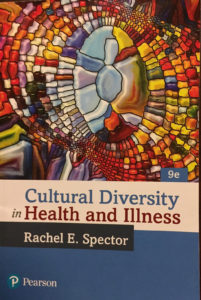 Ninth edition of Cultural Diversity in Health and Illness, Rachel E. Spector. This text continues to promote an awareness of the dimensions and complexities involved in providing CULTURALCARE, a concept that describes holistic healthcare that is culturally sensitive, culturally appropriate, and culturally competent. CULTURALCARE is critical to meeting the complex nursing care needs of a person, family, and community. It is the provision of healthcare across cultural boundaries, and it takes into account the context in which the patient lives as well as the situations in which the patient’s health problems arise. It accomplishes this by examining the differences in HEALTH - the balance of the person, both within one’s being, physical, mental, and spiritual—and in the outside world—natural, communal, and metaphysical - beliefs and practices. Features include – instructions in the utilization of the Heritage Assessment Tool, the CULTURALCARE Model, and the HEALTH Traditions Model to understand HEALTH Beliefs and Practices, a student resource page that is an online study guide that further enriches learning as it features chapter objectives and outlines, a glossary, provocative exercises, activities, and readings that facilitate climbing the steps to CULTURALCOMPETENCY; and the CULTURALCARE Museum with the book’s grey tone illustrations in color. There are also faculty teaching tools available that include an instructor’s manual, power point slides, and several sets of review questions.
Ninth edition of Cultural Diversity in Health and Illness, Rachel E. Spector. This text continues to promote an awareness of the dimensions and complexities involved in providing CULTURALCARE, a concept that describes holistic healthcare that is culturally sensitive, culturally appropriate, and culturally competent. CULTURALCARE is critical to meeting the complex nursing care needs of a person, family, and community. It is the provision of healthcare across cultural boundaries, and it takes into account the context in which the patient lives as well as the situations in which the patient’s health problems arise. It accomplishes this by examining the differences in HEALTH - the balance of the person, both within one’s being, physical, mental, and spiritual—and in the outside world—natural, communal, and metaphysical - beliefs and practices. Features include – instructions in the utilization of the Heritage Assessment Tool, the CULTURALCARE Model, and the HEALTH Traditions Model to understand HEALTH Beliefs and Practices, a student resource page that is an online study guide that further enriches learning as it features chapter objectives and outlines, a glossary, provocative exercises, activities, and readings that facilitate climbing the steps to CULTURALCOMPETENCY; and the CULTURALCARE Museum with the book’s grey tone illustrations in color. There are also faculty teaching tools available that include an instructor’s manual, power point slides, and several sets of review questions.
 Marianne R. Jeffreys - TCNS scholar and NE Chapter President - New book release -- "Teaching Cultural Competence in Nursing and Health Care: Inquiry, Action, and Innovation", 3rd Edition (2016), New York: Springer Publishing. Based on proven research, this textbook is a unique “how-to” for nursing faculty called upon to educate students, nurses, and other health care providers on how to provide optimal care for culturally diverse populations. It offers a systematic approach featuring ready-to-use materials for planning, implementing, and evaluating cultural competence education strategies and programs. A wealth of practical information on all aspects of culturally competent communication and treatment—in both classroom and workplace settings--is supplemented with an assessment and evaluation toolkit that can be adapted for all educational levels. http://www.springerpub.com/teaching-cultural-competence-in-nursing-and-health-care-third-edition.html
Marianne R. Jeffreys - TCNS scholar and NE Chapter President - New book release -- "Teaching Cultural Competence in Nursing and Health Care: Inquiry, Action, and Innovation", 3rd Edition (2016), New York: Springer Publishing. Based on proven research, this textbook is a unique “how-to” for nursing faculty called upon to educate students, nurses, and other health care providers on how to provide optimal care for culturally diverse populations. It offers a systematic approach featuring ready-to-use materials for planning, implementing, and evaluating cultural competence education strategies and programs. A wealth of practical information on all aspects of culturally competent communication and treatment—in both classroom and workplace settings--is supplemented with an assessment and evaluation toolkit that can be adapted for all educational levels. http://www.springerpub.com/teaching-cultural-competence-in-nursing-and-health-care-third-edition.html
Transcultural Nursing Education Strategies: Priscilla Limbo Sagar, EdD, RN, ACNS-BC, CTN-A (Editor)  : The text provides a variety of creative strategies for integrating TCN into academia and practice as a separate course or across existing courses Pedagogical tools include cultural assessment instruments, self-learning modules, role plays, unfolding case scenarios, continuing education, lesson plans, course syllabi, critical thinking exercises, and evidence-based practice information. The book will be of value to nursing students, faculty, educators in staff development settings, and all other professional nurses who wish to provide culturally competent care for their patients. It is a companion volume to the author's text Transcultural Health Care Models: Application in Nursing Education, Practice, and Administration. Link to publication: http://www.springerpub.com/product/9780826195937#.U5YIZvldUuc
: The text provides a variety of creative strategies for integrating TCN into academia and practice as a separate course or across existing courses Pedagogical tools include cultural assessment instruments, self-learning modules, role plays, unfolding case scenarios, continuing education, lesson plans, course syllabi, critical thinking exercises, and evidence-based practice information. The book will be of value to nursing students, faculty, educators in staff development settings, and all other professional nurses who wish to provide culturally competent care for their patients. It is a companion volume to the author's text Transcultural Health Care Models: Application in Nursing Education, Practice, and Administration. Link to publication: http://www.springerpub.com/product/9780826195937#.U5YIZvldUuc
 Transcultural Nursing Theory and Models : Springer Publishing: Application in Nursing Education, Practice, and Administration, Priscilla Sagar, EdD, RN ; Pub. Date: 8/2011; 192 pp., Softcover . ISBN-13: 9780826107480 http://www.springerpub.com/product/9780826107480
Transcultural Nursing Theory and Models : Springer Publishing: Application in Nursing Education, Practice, and Administration, Priscilla Sagar, EdD, RN ; Pub. Date: 8/2011; 192 pp., Softcover . ISBN-13: 9780826107480 http://www.springerpub.com/product/9780826107480
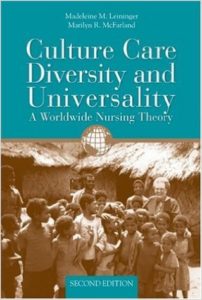 Culture Care Diversity and Universality: A Worldwide Nursing Theory, Second Edition . Jones and Bartlett Publishers is based in Sudbury, Massachusetts, and the website is www.jbpub.com . A direct link to the online catalog page for the book authored by Madeleine M. Leininger, PhD, RN, FAAN, and Marilyn McFarland, PhD, RN, CTN: http://www.amazon.com/Culture-Care-Diversity-Universality-Worldwide/dp/0763734373
Culture Care Diversity and Universality: A Worldwide Nursing Theory, Second Edition . Jones and Bartlett Publishers is based in Sudbury, Massachusetts, and the website is www.jbpub.com . A direct link to the online catalog page for the book authored by Madeleine M. Leininger, PhD, RN, FAAN, and Marilyn McFarland, PhD, RN, CTN: http://www.amazon.com/Culture-Care-Diversity-Universality-Worldwide/dp/0763734373
 Leininger's Culture Care Diversity and Universality, Third Edition A Worldwide Nursing Theory: by Marilyn McFarland, PhD, RN, CTN-A and Hiba Wehbe-Alamah, PhD, RN, FNP-BC, CTN-A. Leininger's Culture Care Diversity and Universality, Third Edition presents an expanded view of the Culture Care Theory as well as integral components of the Ethno-nursing Research Method. The use of the CCT with new research methodologies such as meta-ethno-nursing as well as other established qualitative methods is also covered. The theoretical framework of the culture care theory is used to inform research, teaching, and practice. It is a holistic and comprehensive nursing theory focused on discovering relationships among and between care and health phenomena related to wellness, health, disabilities, and death for people from diverse cultures. http://www.jblearning.com/catalog/9781284026627/
Leininger's Culture Care Diversity and Universality, Third Edition A Worldwide Nursing Theory: by Marilyn McFarland, PhD, RN, CTN-A and Hiba Wehbe-Alamah, PhD, RN, FNP-BC, CTN-A. Leininger's Culture Care Diversity and Universality, Third Edition presents an expanded view of the Culture Care Theory as well as integral components of the Ethno-nursing Research Method. The use of the CCT with new research methodologies such as meta-ethno-nursing as well as other established qualitative methods is also covered. The theoretical framework of the culture care theory is used to inform research, teaching, and practice. It is a holistic and comprehensive nursing theory focused on discovering relationships among and between care and health phenomena related to wellness, health, disabilities, and death for people from diverse cultures. http://www.jblearning.com/catalog/9781284026627/

Leininger’s Transcultural Nursing: Concepts, Theories, Research & Practices, Fourth Edition by Dr. Marilyn R. McFarland and Dr. Hiba B. Wehbe-Alamah offers theoretical and practical guidance on the provision of client-focused care by integrating cultural values, beliefs, and lifeways into an individualized plan of care. Transcultural nursing is a vital, holistic approach that allows nurses and other healthcare providers to provide culturally congruent care for individuals, families, groups, and organizations within a context that is meaningful, beneficial, and inclusive of their healthcare values, beliefs, practices, traditions, communication styles, diverse roles, dietary preferences, and more. The text presents a global comparative perspective about Western and non-Western cultures and examines the future direction of transcultural nursing with insights into rural and urban cultures in the United States including the culture care of homeless mothers and children. The book chapters cover such topics as transcultural nursing, research, and healthcare in Kenya, Southeast Asia, Haiti, Syria, and Taiwan as well as translational research, globalization, conflict resolution, mental health considerations, Ayurvedic medicine, genetics and genomics in healthcare, integration of care and caring, and an overview of transcultural history, concepts, and principles.
Leininger’s Transcultural Nursing: Concepts, Theories, Research, and Practices was edited by two leading experts in the field and uses Leininger's Theory of Culture Care Diversity and Universality and the Ethnonursing Research Method to provide a useful blend of theory and practical clinical information including discussion questions at the end of each chapter. Course development materials available online to educators include chapter-specific quiz questions and PowerPoint slide sets. Link: https://www.mheducation.ca/professional/products/9780071841139/leininger's+transcultural+nursing:+concepts,+theories,+research+%7C%7C+practice,+fourth+edition/
 Global Applications of Culturally Competent Health Care: Guidelines for Practice
Global Applications of Culturally Competent Health Care: Guidelines for Practice
Editors: Marilyn "Marty" Douglas;
- Provides clinical applications in global settings
- Presents detailed case studies and their thorough analyses in a consistent
- format and in accordance with the theoretical basis described in the proposed book
- Based on established international guidelines and standards of practice endorsed by the ICN
This book is unique in its global approach to applying theGuidelines for Culturally Competent Nursing Practice that were recently endorsed by the International Council of Nurses (ICN) and distributed to all of its 130 national nursing associations. The purpose of this book is to illustrate how these guidelines can be put into clinical practice and to show how practitioners from different countries with diverse populations can implement them.
Website: https://link.springer.com/book/10.1007%2F978-3-319-69332-3 Download Flyer Here!
DOI reference for the book: Global Applications of CC Health Care: Guidelines for Practice
https://doi.org/10.1007/978-3-319-69332-3 On this DOI site you need to scroll all the way down to the bottom of the Table of Contents and click on page 2 to get the last 4 chapters
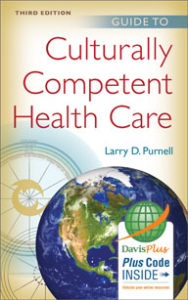 Transcultural Health Care : A Culturally Competent Approach 4th Edition: Larry D. Purnell PhD, RN, FAAN. Uses the Purnell twelve-step model to organize the discussion of each cultural group, looking at the following factors: Inhabited localities, topography, and overview; Communications; Family roles and organization; Workforce issues; Biocultural ecology; High-risk behaviors; Nutrition; Pregnancy and childbearing practices; Death rituals; Spirituality; Health-care practices; Health-care practitioners. Includes multiple vignettes in each culture-based chapter clearly illustrating situations and issues across the nursing continuum. Provides expanded focus on evidence-based practice. Offers full-chapter coverage of 18 additional cultures online at DavisPlus with one-page abstracts in the book appendix. Features knowledge and understanding questions. - See more at: http://www.fadavis.com/product/transcultural-health-care-competent-purnell#/collapseTwo
Transcultural Health Care : A Culturally Competent Approach 4th Edition: Larry D. Purnell PhD, RN, FAAN. Uses the Purnell twelve-step model to organize the discussion of each cultural group, looking at the following factors: Inhabited localities, topography, and overview; Communications; Family roles and organization; Workforce issues; Biocultural ecology; High-risk behaviors; Nutrition; Pregnancy and childbearing practices; Death rituals; Spirituality; Health-care practices; Health-care practitioners. Includes multiple vignettes in each culture-based chapter clearly illustrating situations and issues across the nursing continuum. Provides expanded focus on evidence-based practice. Offers full-chapter coverage of 18 additional cultures online at DavisPlus with one-page abstracts in the book appendix. Features knowledge and understanding questions. - See more at: http://www.fadavis.com/product/transcultural-health-care-competent-purnell#/collapseTwo
 Guide to Culturally Competent Health Care 3rd Edition: Larry D. Purnell PhD, RN, FAAN. Discusses the Purnell Model’s 12 domains of Culturally Competent Care and examines how they apply to all ethnic groups. Highlights specific instructions, guidelines, tips, warnings, intervention strategies, and approaches. - See more at: http://www.fadavis.com/product/nursing-community-public-health-culturally-competent-health-care-purnell-3#/collapseTwo Instructor Resources Classroom Assignments Davis Digital Version - Access your complete text online Additional Instructor Resources Student Resources Cultural Assessment Tool Bonus Chapters Davis Digital Version - Access your complete text online - See more at: http://www.fadavis.com/product/nursing-community-public-health-culturally-competent-health-care-purnell-3#/collapseThree
Guide to Culturally Competent Health Care 3rd Edition: Larry D. Purnell PhD, RN, FAAN. Discusses the Purnell Model’s 12 domains of Culturally Competent Care and examines how they apply to all ethnic groups. Highlights specific instructions, guidelines, tips, warnings, intervention strategies, and approaches. - See more at: http://www.fadavis.com/product/nursing-community-public-health-culturally-competent-health-care-purnell-3#/collapseTwo Instructor Resources Classroom Assignments Davis Digital Version - Access your complete text online Additional Instructor Resources Student Resources Cultural Assessment Tool Bonus Chapters Davis Digital Version - Access your complete text online - See more at: http://www.fadavis.com/product/nursing-community-public-health-culturally-competent-health-care-purnell-3#/collapseThree
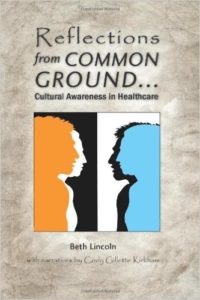 Reflections from Common Ground . . .Cultural Awareness in Healthcare: Author: Beth Lincoln MSN, RN, NP, CTN. Publisher: PESI Healthcare. Reflections from Common Ground . . . Cultural Awareness in Healthcare, showcases many of the opportunities and tools available for healthcare professionals to develop cultural awareness and competency. This unique book offers a way forward and easily lends itself to personal, group or institutional use. It is a tool to promote change, while also an interesting look into the origins of what we encounter in ourselves and others. Discovery begins with our understanding of how cultural influences affect the decisions about our health and wellness. Self-reflective exercises are placed strategically throughout the book, and offer opportunities for readers to gain insight into many cultural beliefs, values, and health care practices. Real-life scenarios are included and illustrate the challenge of finding common ground with patients, families and colleagues. The concluding chapters focus on cultural awareness and competency in various health care institutions and academic settings. Reflections from Common Ground enables the reader, whether a healthcare professional, administrator, or educator, to gain fuller awareness and to open the doors to culturally sensitive healthcare. http://www.amazon.com/Reflections-Common-Cultural-Awareness-Healthcare/dp/0984525432
Reflections from Common Ground . . .Cultural Awareness in Healthcare: Author: Beth Lincoln MSN, RN, NP, CTN. Publisher: PESI Healthcare. Reflections from Common Ground . . . Cultural Awareness in Healthcare, showcases many of the opportunities and tools available for healthcare professionals to develop cultural awareness and competency. This unique book offers a way forward and easily lends itself to personal, group or institutional use. It is a tool to promote change, while also an interesting look into the origins of what we encounter in ourselves and others. Discovery begins with our understanding of how cultural influences affect the decisions about our health and wellness. Self-reflective exercises are placed strategically throughout the book, and offer opportunities for readers to gain insight into many cultural beliefs, values, and health care practices. Real-life scenarios are included and illustrate the challenge of finding common ground with patients, families and colleagues. The concluding chapters focus on cultural awareness and competency in various health care institutions and academic settings. Reflections from Common Ground enables the reader, whether a healthcare professional, administrator, or educator, to gain fuller awareness and to open the doors to culturally sensitive healthcare. http://www.amazon.com/Reflections-Common-Cultural-Awareness-Healthcare/dp/0984525432

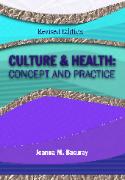 Culture & Health: Concept and Practice (Second Edition): Joanna M. Basuray, Ph.D., RN. Health care providers encounter people who are different from themselves in their ethnicity and language, their cultural traditions and unique beliefs, as well as their values on wellness and illness. Understanding these differences will help health professionals, whether they are nurses, physicians, physical therapists, social workers, public health workers, counselors or educators to give culturally competent care.
Culture & Health: Concept and Practice (Second Edition): Joanna M. Basuray, Ph.D., RN. Health care providers encounter people who are different from themselves in their ethnicity and language, their cultural traditions and unique beliefs, as well as their values on wellness and illness. Understanding these differences will help health professionals, whether they are nurses, physicians, physical therapists, social workers, public health workers, counselors or educators to give culturally competent care.
https://linuslearning.com/product/culture-health-concept-and-practice/
